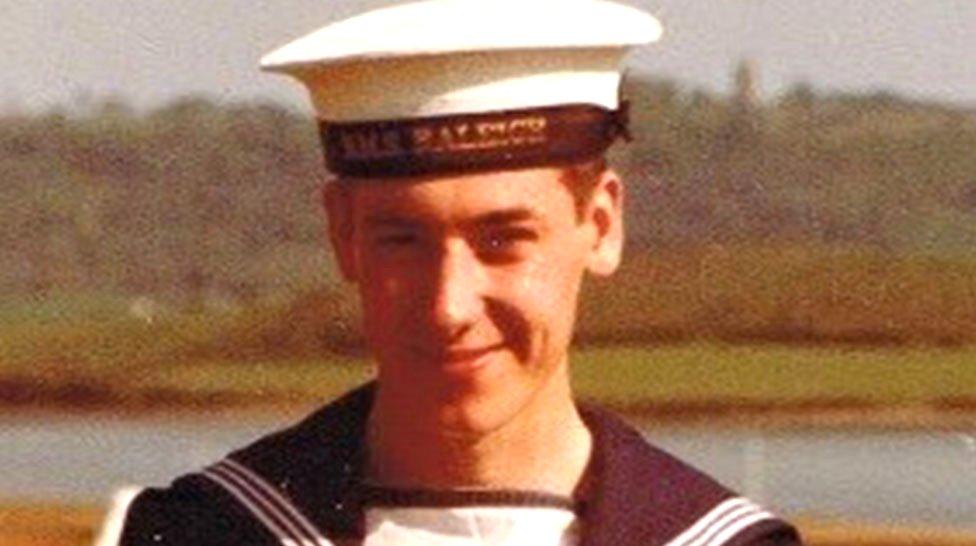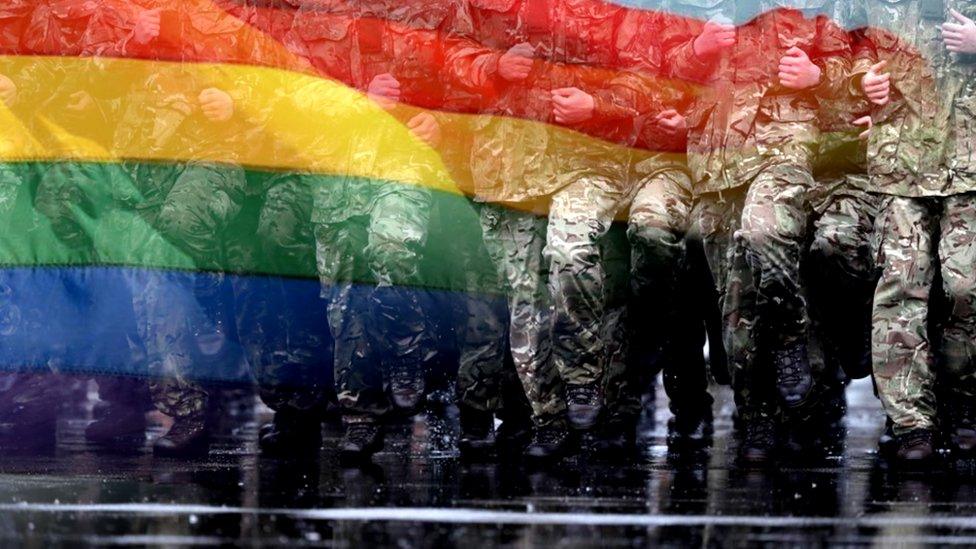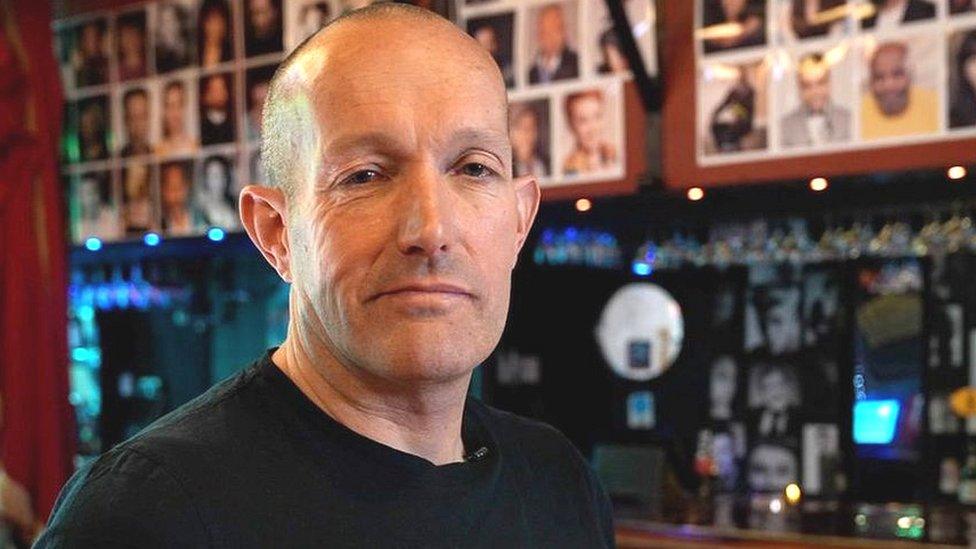'I was dismissed from the Navy for being gay'
- Published

A review into the impact of a ban on LGBT people serving in the military is to be carried out, more than 20 years after the law was changed.
One former Royal Navy medic who was dismissed from the military for being gay in 1982 told BBC Radio's Good Morning Scotland that the experience left him suicidal.
Chris Ferguson, from Edinburgh, said LGBT servicemen and women were treated "disgracefully", and has called for them to receive reparations.
He said up until 1995, "we had gay men in prison for being gay".
Chris, now 61, had been in the navy as a medic for three years, and was studying with the army as well, when he was told the special investigation branch "were coming to investigate me".
"I knew immediately what it was - it was terrifying," he said.
He said they searched his possessions and took him to a detention centre where he was "interrogated for several days, asked the most personal questions" about his sex life.
"I was only 22 at the time. I only joined at 19, when I didn't know what being gay was.
"I was just discovering who I was, realising I was gay."
To this day, he can't be sure how the navy found out he was gay. He insists he was very discreet, and only a few other sailors who were also gay knew he was too.

He said the judicial process he experienced was akin to "what we accuse Iran of".
"I had no access to a lawyer, I was interrogated for days, I was in cells, then I was put on house arrest for six or seven weeks."
One Friday afternoon, he was told his trial would take place the following Monday morning. He entered a guilty plea, he said, because "otherwise there's a good chance of being in the cells" as well as being dismissed.
He said he was told before the trial what the outcome would be, and was only allowed to speak to the sailor defending him for five minutes beforehand.
He added: "In that whole process, I was not allowed to say one single word and no right of appeal at all."
The day he was dismissed was "terrible". Chris said: "I woke up in the morning in a nice warm bed, with something to eat, meals. By the afternoon I was out on the streets homeless with no bed, no food."
He said his family did not accept him, and he considered killing himself.
'My whole life fell apart'
Leaving the forces was "devastating", and felt more like losing his family than losing his career: "When you're in the forces, it becomes your life. It's everything. And suddenly it's all gone.
"My whole life fell apart."
He was left homeless and in "absolute destitution". At one point, he ended up sleeping in a park.
"I didn't even have any friends - all my friends were in the Navy and those doors were firmly closed to me," he said.
Chris is now going for weekly therapy sessions with a military mental health charity to deal with the trauma he experienced 39 years ago.
"It still brings tears to my eyes, and nightmares," he said.
A Ministry of Defence spokeswoman said: "It will always remain deeply regrettable that personnel were historically discriminated against because of their sexuality. It was unacceptable then and it is unacceptable now.
"We take the wellbeing of all those who have served extremely seriously and have a range of support mechanisms in place for our veterans."
'Lives shattered'
The review into the impact of the ban comes more than two decades since the law on LGBT people serving in the military was changed.
It was illegal to be gay in the UK military until 2000, when the law was changed after four servicemen and women, who had been sacked over their sexual orientation, won a case in the European Court of Human Rights.
Prior to the change LGBT people serving were imprisoned if their sexuality or gender identity was discovered by the forces.
The change in the military's handling of homosexuality came 33 years after homosexual acts were decriminalised between two consenting adults over the age of 21 in most cases.
Craig Jones, of the charity Fighting With Pride, said he welcomed the review.
He said the review must hear accounts from veterans "whose lives were shattered by criminal convictions, prison sentences and dismissal in disgrace, and of the enduring impact on those lives".
"Thousands more ended careers prematurely through administrative or other routes."
He said the charity looked forward to working with the government to achieve "an honourable outcome" for the veterans affected.

How will the review work?

The full scope of the review, which launched on Wednesday, is yet to be announced.
But it's set to look at three main areas:
The potential impact the ban may have had on LGBT+ veterans, including the consequences for their future lives
The accessibility of veterans' services for LGBT+ people
How to ensure that LGBT+ veterans are recognised and fully accepted as members of the armed forces
The government says it will set out how people affected by the ban will be able to share their experiences for the review once an independent chair has been announced.
A Ministry of Defence spokesperson said more details would be set out in "due course".
Once it is finished, the chairperson will make recommendations to the government.
Veterans minister Leo Docherty said: "While the modern military embraces the LGBT community, it is important that we learn from the experiences of LGBT veterans who were affected by the pre-2000 ban.
"This review will allow the voices of veterans to be heard and importantly will help us better tailor support to the community."
If you've been affected by self-harm and emotional distress, help and support is available via the BBC Action Line.
Related topics
- Published19 January 2022
